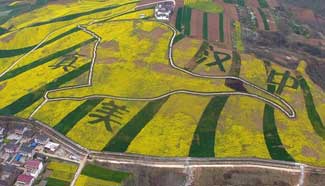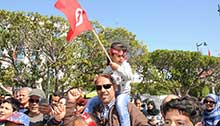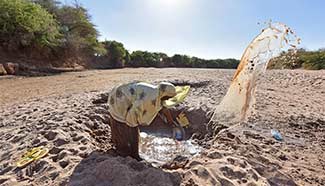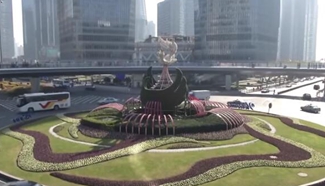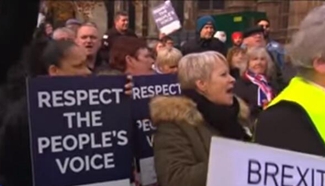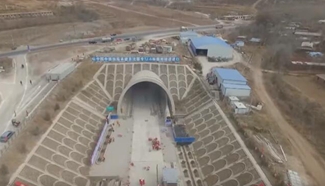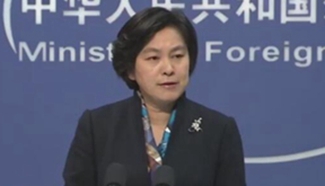By Burak Akinci
ANKARA, March 21 (Xinhua) -- Golden beaches, sun, sand, a rich culture...Turkey has a lot to offer tourists but discouraged by a spate of terror attacks and a failed coup last year which caused havoc for the major industry.
And political tensions ahead of a crucial referendum don't help much either.
Turkey expressed hope on Friday for a revival of its tourism industry after security concerns caused a 30 percent drop in foreign visitors and revenues last year, the lowest level in nine years.
The sector was also hit hard during tensions between Ankara and Moscow following the downing of a Russian fighter jet in November 2015.
Both countries subsequently normalized their relations and the first Russian charters landed in the ever sunny holiday southern resort of Antalya last September.
"We are seeing some very positive signs, giving us hope," Turkish Culture and Tourism Minister Nabi Avci said at a tourism fair last week in Berlin, Germany.
In a bid to halt the decline, the government is trying to boost the travel sector, which contributes about 30 billion U.S. dollars annually to the economy, by extending fuel subsidies for airlines and helping hotels obtain loans, said Avci.
Nevertheless, the industry remains battered and bruised after a very bad year, according to statistics, and substantial numbers of job losses have been announced by the state.
According to sector sources, over 42,000 people lost their jobs and more are expected until the end of this year's season.
The number of employees at accommodation facilities fell by 14 percent in 2016 from previous year as the country welcomed 36 million foreigners in 2015.
Hundreds have been killed since 2015 in Turkey in terrorist attacks linked to the Islamic State (IS) and Kurdish groups.
Turkey's internal agenda is currently mainly focused on a political campaign ahead of a referendum in April which would considerably strengthen President Recep Tayyip Erdogan's powers. Disagreements regarding this divisive process with European countries aren't helping the tourism sector recover either.
"In 2016, security concerns prevented foreign tourists from visiting Turkey and this year it's diplomatic tensions with European nations. There will inevitably be a drop in visitors from European nations," explained Secretary General of Tursab, the association of Turkish travel agencies, Cetin Gulcun to Xinhua.
For example, tour operators from Germany, the source of around 15 percent of Turkey's tourists, are asuffering due to security worries exacerbated by rising tensions over Turkish political rallies in Germany as well as the detention of a Turkish-German journalist.
Germany is the main source market for Turkey with 3.89 million visitors in 2016.
"We sincerely hope that the diplomatic tension with European countries will end because the sector has suffered a lot these two years," said Gulcun.
Turkish Foreign Minister Mevlut Cavusoglu, who harshly criticized Germany and the Netherlands for preventing him and other ministers to campaign in their countries to woo the Turkish diaspora's votes, called on tourists to visit and spend their holidays on the Turkish riviera.
"There is no reason for our German friends to fear visiting Turkey as it is just as safe as Germany," he said
Ankara recently announced fuel subsidies of 6,000 dollars per flight carrying up to 200 passengers for scheduled flights as well as charter carriers, and the number of eligible airports has been increased from five to 14.
Sector sources welcomed the steps but remain skeptical whether they are sufficient.
The core of the problem is the fact that tens of thousands of the 1.2 million people employed in the tourism industry still face the threat of loosing their jobs toward the end of the summer season.
In Gaziosmanpasa, a posh neighbourhood of the capital Ankara, Ertan Saka, who works in a travel agency, explains to Xinhua that dozens of three and four star hotels will be closed this year around Antalya.
"Many establishments lost most of their workforce who were laid off and thus cannot compete with five star hotels which offered massive discounts for early bookings," he said.
But hopes are high on the Eastern front for professionals as Turkey plans to host thousands of Ukrainians and some two million tourists from Iran this year, after the problem with charter flights was resolved with Tehran.
Iran has become one of the leading tourism markets for Turkey due to its cultural, geographical and historical proximity.
"Iranian tourists generally prefer cultural tourism and not the sun-sea duo which is our main concern now. It's still a positive step, but we do not have the luxury of a choice," said Cetin Gulcun.
Diversifying products for the consumer is key in the tourism industry.
Health and sports tourism are in vogue and active 12 months of the year.
Turkey hosted in 2016 nearly 750,000 health tourists, most of whom came for medical tourism involving plastic and eye surgery, dental operations and hair transplants for example.
The revenues from health and sports tourism amounted to 5.8 billion dollars, said Emin Cakmak, President of the Health Tourism Development Council, as quoted by the local Daily Sabah.



